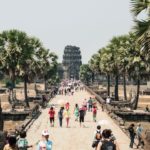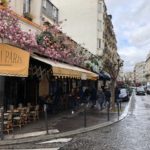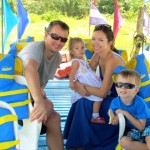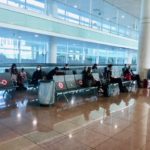A Conversation with The Wandering Scholar Co-Founders

Back in September, I attended a screening of the new documentary called Gringo Trails at Hostelling International NYC. The film was about the darker side of the backpacker’s journey: the impact on local cultures around the globe. When I walked in, I was greeting by the The Wandering Scholar team along with the smell of bagels, cookies, and coffee. Yum.
It was the first time I participated in an event hosted by the The Wandering Scholar, and I wanted I wanted to learn about co-founders, Tamara and Shannon. Here’s some of the backstory of the Wandering Scholars.
A Conversation with The Wandering Scholar Co-Founders
Tell us about yourselves. Where are you from? What were you doing professionally before you started The Wandering Scholar?
Shannon grew up in New England and first fell in love with travel during her senior year at a private high school when she studied in Cuernavaca, Mexico for three months. While not on full scholarship, like many of her travel mates, Shannon would never have been able to participate in such a trip if it had not been part of her tuition package. This introduction, at a young age, to the tension between the transformative power of educational travel and the challenges of access, was early inspiration for what would one day become The Wandering Scholar. In the summer of 2009, Shannon led a group of 15 high school students on an adventure and service learning trip through Costa Rica with Walking Tree Travel. Witnessing the personal transformation of each student throughout the trip has further solidified her desire to make international travel and learning experiences accessible to all youth.
Shannon’s professional life has been committed to education within a variety of formats from traditional classrooms to virtual platforms and with a range of audiences, from her early years as a Spanish teacher in independent schools to working with adult learners at both Boston University’s School of Public Health and currently at General Assembly, an educational start-up focused on technology, design and entrepreneurship. She studied international relations at Georgetown University’s School of Foreign Service where she focused on language and cultural studies of Latin America and completed her EdM in International Educational Development at Boston University.
Tamara grew up in Denver, Colorado and spent the first half of her education attending poorly funded public schools. After receiving a generous scholarship, she enrolled at an area private school, where international education was deeply ingrained into both the culture and curriculum. Even as a seventh grader, she lagged behind her peers, who by then had been studying foreign languages, learning about other countries, and traveling abroad for several years. While initially overwhelmed, she soon began to thrive in this environment, and was eventually able to put her Spanish and French skills to the test on class trips to Mexico and France.
These experiences helped solidify a passion for cross-cultural exchange, which she continued to pursue as a Spanish major at the University of Pennsylvania (when she studied abroad in Buenos Aires, Argentina), and later as a PhD student in Latin American History at the University of Michigan (when she received a Fulbright award for study in Peru).
Today, Tamara is an Assistant Professor of Colonial Latin American History at the University of Pennsylvania. As someone who was fortunate enough to gain exposure to international education at a young age, she knows how important those experiences are in shaping career possibilities. She sees The Wandering Scholar as an important step towards ensuring that more underserved students receive the kinds of opportunities that helped change her own life.
Why did you decide to start the organization?
One of the unique aspects of the independent school curriculum, we both benefited from as high school students, is the opportunity to spend a semester studying abroad (typically, with no additional tuition costs associated with travel). By coincidence we both chose to travel to Mexico. For our families, education was paramount, however neither of our families had any wiggle room for “extras.”
In other words, had a semester in Mexico been an additional cost–beyond what our scholarships and financial aid covered–the subject of applying would never have been broached out of respect for all that our parents were already doing to ensure we had the best educational opportunities. It was a series of key decisions, and financial sacrifices, on the part of our parents, that got us to a specific place where educational travel was not viewed as an “extra” but rather as an integral part of the curriculum that all students could benefit from regardless of their financial background.
While the Mexico trips during high school planted the seed, it was the decisions we each made following (and inspired by) those trips that really led us, individually, to the conclusion that something like The Wandering Scholar needed to exist.
After high school, Shannon went on Georgetown University’s School of Foreign Service, where she focused on regional studies of South and Central America and spent six months studying in Argentina. A core requirement of the school was that you graduate proficient in a language, which for her was Spanish.
This led her to her first job out of college as a Spanish teacher. The light bulb for Shannon came later, as a Spanish teacher at one of the charter schools outside of NYC where she found herself always making the same basic point: learning a language may begin in the classroom but where it comes to life is when you immerse yourself through travel.
What is so transformational about your first independent travel experience, is less about the big moments like climbing to the top of the Pyramid of the Sun at Teotihuacan. It’s more about the intimacy you develop with both your fellow travelers, and more importantly, with yourself.
She knew she could hook her students on learning Spanish with the travel angle, since for the majority of them, financial resources were readily available but this begged the obvious question–what would she tell the majority of students all over the country who do not have these resources? She didn’t have a great answer. So the spark that is now The Wandering Scholar was lit.
She made moves to apply to graduate school (the only way she could convince her practical side that she would have enough time to develop a program model), and while there, she focused all her courses and research papers on related topics.
Tamara’s journey to co-founding The Wandering Scholar was similar to Shannon’s in that it was made up of several formative experiences. The first came in high school, when she was a scholarship student at a private school that offered international excursions as part of its curriculum. Thanks to the scholarship, she was able to travel abroad twice, once to Mexico and, a year later, to France.
Both experiences improved her foreign-language skills and cultivated her love of travel. By the time she got to college at the University of Pennsylvania, she knew she wanted to pursue a major that allowed her to continue building those skills and nurturing that love.
She was able to draw upon these experiences (and more scholarship support) to study abroad in Argentina, where I had the chance to conduct independent research as part of her travel program. From there the decision to pursue graduate study in Latin American history was both a natural and easy choice, given her early international education experiences. She never doubted her ability to immerse herself in a foreign culture and conduct in-depth research, because she had already done so at such a young age.
Tamara’s second formative experience came when she was a PhD student conducting dissertation research in Peru, with the support of a Fulbright Doctoral Dissertation Research Abroad Award. As a first-generation college student from a low-income background, she was surprised to learn how few students like her had received Fulbright scholarships.
When she broached the subject with the fellowship coordinator, she was told that the problem was with the “quality” of those students’ applications. They didn’t have the language skills, the woman told her, or the travel backgrounds that were necessary to convince the selection committees of their ability to carry out independent research in foreign countries.
Because of these experiences, having learned first-hand how early exposure to international education can change the entire course of one’s life, and put amazing experiences within closer reach, she knew how important it was to make sure others like her could do the same. And when a mutual contact put her and Shannon in touch, The Wandering Scholar went from an idea to a reality.
Eventually, through a series of independent conversations with mutual friends, who are the directors of our partner student travel organization, Walking Tree Travel, we were introduced in 2009 in New York City. It was so encouraging for us both to meet someone else who had been wrestling with the same types of questions about access to and diversity of those who study abroad and had also come to the conclusion that something like The Wandering Scholar needed to be created. The day we met, we decided we would work together to start the The Wandering Scholar.
What were some of the challenges and highlights of launching the Wandering Scholar?
The end goal has always been to make The Wandering Scholar a full time project and there have been many moments of banging our heads against the wall trying to balance full time careers, operating The Wandering Scholar and life in general. We’ve had some frustrating experiences applying for large grants that would enable this to become a full time project, one of the most memorable being the time a foundation told us that in order to apply for a grant that would pay for a full-time salary, we would need to prove that a person had already been committed to the project full time. The obvious question being: how exactly would said person be supporting themselves in the meantime, without the funding to do so?
Some people are able to go all out when they have an idea, quit their job, beg and borrow until they land the big donation, and more power to them. For us however, that is not our reality. We both have had to work full time through our twenties to pay off student loans and support ourselves. And, at the end of the day, some important lessons have been learned from not getting the “big break” and having to balance multiple priorities:
-We’ve learned that there is a lot more time in a day, in a week, than you realize (especially once you kick the TV to the curb).
-We’ve learned that we can do it (build a site, recruit a board, host a webinar) ourselves.
-And we’ve learned when to admit when there is something we really can’t do ourselves (the famous 501 c3 application, for example).
-Most importantly, we’ve learned that something does not have to be huge and take off immediately to be meaningful.
Of course we would much rather be working with 500% more students every summer but this does not mean our current approach is not valuable. We are contributing to a conversation about the importance of global travel for students of all socioeconomic backgrounds, we are showing students that there are opportunities out there to make their dream a possibility, and hopefully we are inspiring other people to start something good.
What is your day-to-day work like?
As mentioned before, both of us have full-time careers outside of The Wandering Scholar and to complicate things further we live in different cities. Therefore, much of our work is done remotely using the cloud and chat. We typically reserve a few hours on the weekend or a weekday evening to get online and discuss what needs to be done for the week. This can be anything from updating our website to communicating with our board to reviewing scholarship applications.
Each semester we bring on at least one intern, typically a graduate student studying international education, to help us with administrative logistics. We have learned as much from our interns as they have from their experience working with our organization. At least every quarter we meet in person to hash out bigger ideas and challenges and twice a year we organize in person meetings with our board of directors.
How often do you get to travel?
Not as much as you’d think! But that’s okay. For Shannon, as a Spanish teacher with summer vacation, she made it a goal to travel independently and improve her Spanish skills every summer for at least two weeks. However after grad school, major international trips took a back seat to developing other parts of her professional life including the founding of The Wandering Scholar. Travel lately has revolved around celebrating big moments of family and friends–luckily a few have been in some far off places.
For Tamara, travel is a crucial part of her job. She regularly travels to Peru for research, as well as to other parts of South America and Europe. Last summer she spent three months in England, Spain, and France, conducting research for a new book on slavery and piracy in the early-modern era.. The problem is that she only seems to travel for work, rarely getting to do so for pleasure.
The key for both Shannon and Tamara is to view each opportunity to visit a new place, or revisit an old favorite, whether it be a 3-hour drive or an 8-hour flight away, as a chance to learn something new about yourself and the world around you. Spend time researching the area, allow for on-the-ground improvisation
A Conversation with The Wandering Scholar Co-Founders
From your experience, how is working with high school students different than working with others?
What is so transformational about your first independent travel experience, is less about the big moments like climbing to the top of the Pyramid of the Sun at Teotihuacan. It’s more about the intimacy you develop with both your fellow travelers, and more importantly, with yourself.
What transforms you are the small moments. Finding humor with the stranger sitting next to you at about hour 8 of sitting on a bus with no bathroom break. The glimmer of victory in your host mother’s eye when you finally bite into that onion laden (and delicious) mole – after your emphatic claim: “Pero, no me gustan las cebollas.” Or the breakthrough moment you have with a foreign language when you wake up one morning realizing you were dreaming in it.
It’s those moments, that technically could happen anywhere (a road trip to the next state, a local Mexican restaurant, your own bed after studying Spanish all night) but for some reason are elevated during travel, that end up staying with you the longest because they inform how you will deal with future uncomfortable situations, unknowns and challenges.
What advice would you give to other women who had similarly impactful experiences while abroad and want to continue their work?
Our advice would be to look into volunteering with an organization like ours, whether as a board member, intern or mentor. For example, travel mentors play an integral role in The Wandering Scholar educational model. The Wandering Scholar mentors, in addition to serving as role models of global citizens (not only for their own travel backgrounds but also for the career paths that they’ve followed as a result), assist the participants and their family through the process of preparing and planning for the trip, and help the participants create a strategy for recording, presenting and utilizing the experiences gained during their trip.
They are an asset to our program not only for the duration of our 10-week Global Skills Fellowship Program, but for as long as the mentor and mentee choose to stay connected. Mentors share stories from their own travel experiences with their Scholar, provide college and career guidance, and help our Scholars connect the experience of international travel with long-term personal fulfillment and professional success.
A Conversation with The Wandering Scholar Co-Founders
Anything else you’d like to share with the Pink Pangea community?
We envision The Wandering Scholar as a starting point for a lifetime of meaningful engagement with the world. A key lesson we want students to learn is that the Wandering Scholar experience doesn’t end when the wheels of the plane touch back down in San Francisco or New York. This is why we require students to contribute to our blog and complete and share a documentation project after their trip has ended.
Being a Wandering Scholar is a way to approach every new situation with an eye towards what you can you do to prepare yourself, what can you learn from it and how can you take those learnings and experiences and communicate them in a meaningful way with others. The point being, should they never travel internationally again, for whatever reason, they will still be able to approach each new, challenging life experience as an opportunity for discovery and growth–even when it’s taking place outside of a traditional classroom context.
Background on our program:
The Global Skills Fellowship program is our original flagship program and the primary focus of our human and financial resources. The program serves students around the country and runs for 8-10 weeks from June to August. Beyond a full scholarship towards global travel, the program offers students an innovative pre-departure and re-entry curriculum that employs open-source educational technology and communication tools.
The goal of the program is to help Wandering Scholars develop intercultural-communication skills, leverage social media for global exposure, and produce digital documentation projects to share with their home and virtual communities.
The Journalism Fellowship program was developed in 2011 in collaboration with Walking Tree Travel for students receiving partial financial aid directly from Walking Tree Travel. Beyond a partial scholarship towards travel with Walking Tree, the program offers students an opportunity to gain skills in travel journalism.
The goal of the program is to helps Journalism Fellows develop the skills to research and disseminate feature-length articles about their host countries. After facilitating the program for two years, we have now turned administration over to Walking Tree directly and we remain the knowledge partner.
A Conversation with The Wandering Scholar Co-Founders

A Conversation with The Wandering Scholar Co-Founders








